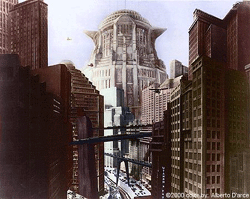Utopia, is a word coined by Sir Thomas More in the
early 16th century, translating from the ancient Greek uo (not, no), and topos (place) as
"the land of no place." It is an ideally perfect land,
especially in its political, social, and moral characteristics. It's
scheme for social and political reform are impractical, idealistic, and
anti-intellectual, though, according to a friend of mine it still an interest and goal for which humanity
strives. It has been often popularized in such books as Bradbury's Fahrenheit
451, Burgess's A Clockwork Orange, Golding's Lord of the
Flies, Huxley's Brave New World, More's Utopia (1516),
Orwell's Animal Farm and 1984, Vonnegut's Player Piano,
and H.G. Wells's The Time Machine, and movies like A Clockwork
Orange, Animal Farm, Brazil, Fahrenheit 451, Gattica, Metropolis,
and Shangri-La.
Here are two sites where you
can read more about utopias: a link to the New York City Public
Library's documentation for the Western World's search for the ideal
society (visit: Utopia in History), and a link to utopia
as defined by writers, architects, and thinkers located within
Anachron City.

Fritz Lang's vision of the
future in his film Metropolis.
|
|
Dystopias, in contrast, are an imaginary (though
sometimes real!!!) land or state in which the condition of life is
extremely bad, as from deprivation, oppression, or terror.
Though their original visions are
"perfect," utopian societies, when practiced, often fail for
several reasons due to human nature and become dystopias -- some of which
you may have heard of, read about, and discussed both in and out of
school.
Would you like to live
in a society in which you are equal in every way to every other citizen, a
society in which competition is not allowed, in which intellectualism is
discouraged, in which the assertion of your natural and unique abilities,
and individual rights and qualities are punished?
Some failed utopian societies:
The killing
fields of Cambodia,
The Paris
Commune of 1871,
Nazi Germany.
Continue examining the work done by the New
York City Public Library by exploring their documentation on dystopias
in the Twentieth Century.
|